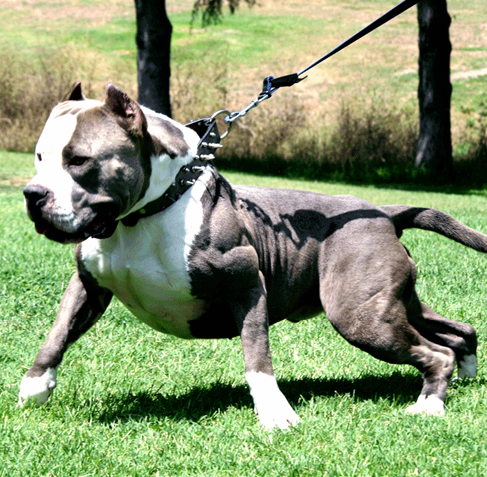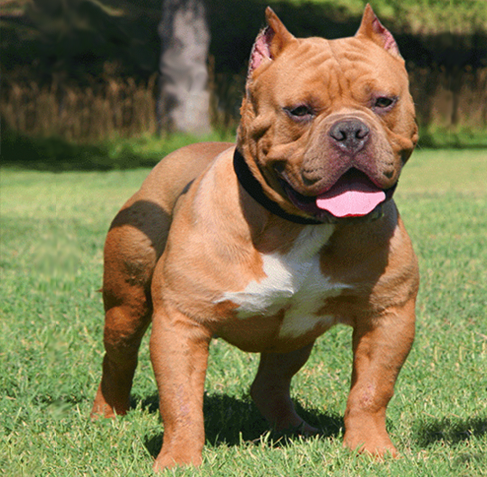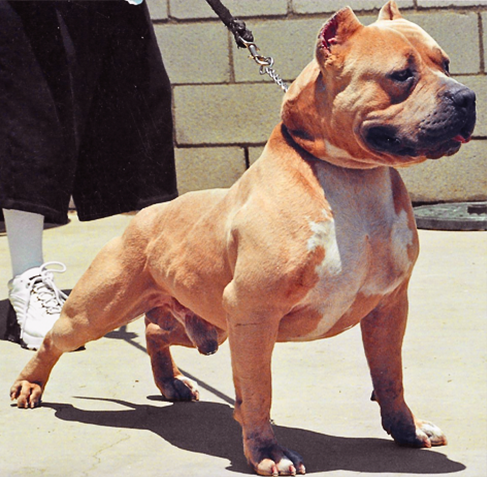ROYAL BLOODLINES REGISTRY
STANDARD
XL
CLASSIC
American Bully –RBR
Official Breed Standard
Royal Bloodlines Registry (RBR)
Revised and Expanded Standard
History
The American Bully originated in Los Angeles California in the late 1980s and early 1990s as breeders sought to create a companion dog with the physical stature of the American Pit Bull Terrier but a more muscular build and a temperament better suited for family life. The foundation of the breed includes influences from the American Pit Bull Terrier, American Staffordshire Terrier, and various Bulldog breeds, selectively bred to enhance specific traits such as bone density, head size, muscle mass, and overall stability.
While retaining the tenacity, intelligence, and confidence of its ancestors, the American Bully is distinct in both appearance and temperament. Over the past few decades, the breed has evolved significantly and is now recognized globally, celebrated for its balanced power, compact frame, and loyal nature.
General Appearance
The American Bully should present a strong, confident, and muscular appearance with a blocky, proportionately large head, broad shoulders, and a compact frame. The breed embodies power without exaggeration and should never appear excessively overdone or hindered in mobility.
The American Bully exudes a natural presence of strength and determination, combined with a poised, stable, and friendly demeanor. Both males and females must display balanced proportions, with females being slightly less muscular and more refined.
Size Variants
The American Bully is classified into size variants. All types are judged by the same standard, with height being the only differentiating factor. Dogs must remain within healthy proportion.
· Standard:
o Males: Over 17–20 inches
o Females: Over 16–19 inches
· Pocket:
o Males: under 17 inches, not below 14 inches
o Females: under 16 inches, not below 13 inches
· XL:
o Males: Over 20–23 inches
o Females: Over 19–22 inches
· Classic (Same height as Standard, but lighter bone and muscle mass)
Note: Weight should be proportional to height and frame.
Head
The head is one of the most defining features of the breed. It should be large, broad, and pronounced, yet in proportion with the body.
· Skull: Broad, flat between the ears with slight to moderate stop.
· Muzzle: Medium but not short, wide with a well-defined jawline. Should not be snipey or excessively long.
· Cheeks: Well-muscled with visible definition.
· Stop: Pronounced, creating a clear transition between skull and muzzle.
· Jaw: Strong and prominent lower jaw with visible bite power.
· Lips/Flews: Slightly loose is acceptable; excessive flews are undesirable.
· Bite: Scissor bite preferred. Level bite acceptable.
· Eyes: Set low on the skull, oval to slightly round, wide apart. All colors acceptable except albinism (pink). Must have eyelid pigment.
· Ears: High-set. Cropped or uncropped (rose or half-prick).
Head Faults
· Overly domed skull
· Weak lower jaw
· Excessively long or narrow muzzle
· Full drop ears (uncropped)
Neck
Short to medium in length, thick, and muscular with a slight arch. It widens progressively from the base of the skull to the shoulders. Slightly loose skin is acceptable.
Forequarters
· Shoulders: Strong and muscular with good angulation.
· Forelegs: Straight, heavy-boned, and set wide apart.
· Elbows: Tight and close to the body.
· Pasterns: Short and strong, nearly vertical.
· Feet: Compact, round, with tight arched toes.
Forequarter Faults
· Out at the elbows
· Weak pasterns
· Bowed front
· Flat feet
Body
The body is compact, broad, and heavily muscled.
· Chest: Broad and deep, extending close to the elbows.
· Ribcage: Well sprung with evenly spaced ribs.
· Back: Short, strong, with a slight slope from withers to croup.
· Topline: Level to slightly sloped from shoulders to rump.
· Loins: Short and muscular.
· Abdomen: Slight tuck-up behind the ribs.
Hindquarters
· Thighs: Muscular, with good inner and outer development.
· Stifle: Moderate angulation.
· Hocks: Well let down, turning neither in nor out.
· Rear View: Legs parallel when viewed from behind.
Hindquarter Faults
· Cow-hocked
· Sickle-hocked
· Straight stifles
· Over-angulated or excessively high hocks
Tail
Medium to short in length, thick at the base and tapering to a point. Set low and carried in a relaxed curve, similar to an old-style water pump handle.
Tail Faults
· Kinked tail
· Gay tail
· Corkscrew or tightly curled tail
· Disqualification: Docked tail (unless medically documented)
Coat
Short, glossy, and close-fitting. Texture is smooth, firm to the touch.
Coat Faults
· Sparse, patchy coat
· Wavy or wiry texture
· Disqualification: Long coat, Merle coat
Color
All coat colors and patterns are acceptable with the exception of Merle. Brindle, piebald, tri-color, and solid color variations are all permissible.
Disqualification
· Merle pattern (including blue merle, red merle)
Gait & Movement
Movement should be smooth, confident, and powerful, reflecting a stable rear and strong drive from behind.
· Front legs may show slight outward turn due to chest width.
· At increased speeds, limbs converge toward a centerline.
· Moderate roll may be present.
Movement Faults
· Hackney gait
· Crossing over or paddling
· Rear legs not tracking true
· Pacing
· Excessive roll hindering movement
Temperament
Stable, confident, and friendly with people and other dogs when properly socialized. The American Bully should demonstrate eagerness to please and high intelligence. Aggression towards humans is not acceptable.
Disqualifying Temperament Faults
· Extreme shyness or skittishness
· Viciousness or unprovoked aggression toward humans
Disqualifications
· Merle coat pattern
· Long coat
· Albinism (pink eyes or nose, complete lack of pigment)
· Docked tail (without medical justification)
· Deafness in one or both ears
· Undescended testicles (past 6 months of age)
· Aggression toward humans
· Extreme fear or instability




